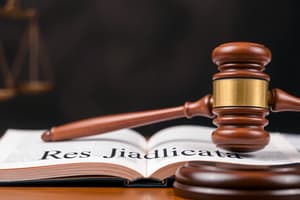Podcast
Questions and Answers
What is required within 14 days after the date of the sentence for an appeal to proceed?
What is required within 14 days after the date of the sentence for an appeal to proceed?
- Request for bail pending appeal
- Submission of additional evidence
- A petition for review
- Notice of Appeal (correct)
Under which condition can an appeal against a plea of guilty be made?
Under which condition can an appeal against a plea of guilty be made?
- If new evidence has emerged
- Only on the legality of the sentence (correct)
- On the basis of insufficient representation
- For any procedural irregularity
What happens to an appeal if the petition is not filed within the stipulated timeframe?
What happens to an appeal if the petition is not filed within the stipulated timeframe?
- The appeal is automatically considered withdrawn (correct)
- The appeal can still go to hearing
- The appeal may proceed if justification is given
- The court may grant an extension
Which of the following statements about the appeal process is true?
Which of the following statements about the appeal process is true?
In what situation can an appeal be summarily rejected?
In what situation can an appeal be summarily rejected?
What must the Court of Appeal do when reviewing a death sentence?
What must the Court of Appeal do when reviewing a death sentence?
Which of the following conditions is necessary for a private prosecution to appeal against an acquittal?
Which of the following conditions is necessary for a private prosecution to appeal against an acquittal?
What is the role of the Public Prosecutor in the appeal process according to the provisions?
What is the role of the Public Prosecutor in the appeal process according to the provisions?
When can the appellate court take additional evidence during the appeal process?
When can the appellate court take additional evidence during the appeal process?
How many judges are typically involved in hearing appeals, unless directed otherwise?
How many judges are typically involved in hearing appeals, unless directed otherwise?
How do criminal motions differ from appeals?
How do criminal motions differ from appeals?
What is the minimum notice required before hearing a criminal motion?
What is the minimum notice required before hearing a criminal motion?
What does Amarjeet Singh v PP clarify regarding criminal motions?
What does Amarjeet Singh v PP clarify regarding criminal motions?
Which form is specifically related to the variation of bail in criminal motions?
Which form is specifically related to the variation of bail in criminal motions?
What is a crucial difference between criminal motions and criminal revisions?
What is a crucial difference between criminal motions and criminal revisions?
What is allowed concerning the adjournment of criminal motions?
What is allowed concerning the adjournment of criminal motions?
What action must be taken with the notice of motion prior to a hearing?
What action must be taken with the notice of motion prior to a hearing?
Which aspect is NOT a function of a criminal motion?
Which aspect is NOT a function of a criminal motion?
Which form is used for the adduction of further evidence?
Which form is used for the adduction of further evidence?
In terms of hearings, how can a criminal motion be dealt with?
In terms of hearings, how can a criminal motion be dealt with?
Which statement correctly describes who can appeal in a criminal case?
Which statement correctly describes who can appeal in a criminal case?
What is the timeframe within which a Notice of Appeal must be filed?
What is the timeframe within which a Notice of Appeal must be filed?
Under what circumstance can new grounds be raised in a Petition of Appeal?
Under what circumstance can new grounds be raised in a Petition of Appeal?
What must be demonstrated for the court to reverse a conviction?
What must be demonstrated for the court to reverse a conviction?
What does the stay of execution of sentence pending an appeal allow?
What does the stay of execution of sentence pending an appeal allow?
Which of the following types of decisions can be appealed?
Which of the following types of decisions can be appealed?
Which of the following is NOT allowed in the context of appeals?
Which of the following is NOT allowed in the context of appeals?
What triggers the Grounds of Decision in an appeal process?
What triggers the Grounds of Decision in an appeal process?
Which statement about the appeal process is accurate?
Which statement about the appeal process is accurate?
What is one function of a Petition of Appeal?
What is one function of a Petition of Appeal?
What is a key characteristic that distinguishes criminal revisions from appeals?
What is a key characteristic that distinguishes criminal revisions from appeals?
In which scenario can court revisionary jurisdiction NOT be invoked?
In which scenario can court revisionary jurisdiction NOT be invoked?
What must be demonstrated for a court to exercise revisionary powers in the case of an error?
What must be demonstrated for a court to exercise revisionary powers in the case of an error?
What is the primary purpose of a criminal motion?
What is the primary purpose of a criminal motion?
What must occur for a lower court's sentence to trigger revisionary powers?
What must occur for a lower court's sentence to trigger revisionary powers?
Under what section is there no appeal against certain orders made by lower court judges?
Under what section is there no appeal against certain orders made by lower court judges?
Which of the following accurately describes the nature of criminal revisions?
Which of the following accurately describes the nature of criminal revisions?
What is one example of 'serious injustice' mentioned in relation to criminal revisions?
What is one example of 'serious injustice' mentioned in relation to criminal revisions?
What powers does the General Division of the High Court hold in revisions?
What powers does the General Division of the High Court hold in revisions?
Which situation would NOT typically involve a criminal motion?
Which situation would NOT typically involve a criminal motion?
Flashcards
Appeal against sentence
Appeal against sentence
A legal process to challenge a court's decision regarding a sentence.
Notice of Appeal
Notice of Appeal
Formal notification of intent to appeal; must be filed within 14 days of sentence.
Limited Appeal Grounds
Limited Appeal Grounds
Appeals are restricted to the legality of the sentence, not the conviction itself.
Appeal against Acquittal
Appeal against Acquittal
Signup and view all the flashcards
Petition of Appeal
Petition of Appeal
Signup and view all the flashcards
Stay of Execution
Stay of Execution
Signup and view all the flashcards
Appeal Hearing
Appeal Hearing
Signup and view all the flashcards
Respondent's Absence
Respondent's Absence
Signup and view all the flashcards
Death Sentence Review
Death Sentence Review
Signup and view all the flashcards
Appellate Court Orders
Appellate Court Orders
Signup and view all the flashcards
Appealable Orders
Appealable Orders
Signup and view all the flashcards
Who can appeal (criminal cases)?
Who can appeal (criminal cases)?
Signup and view all the flashcards
Public Prosecutor's appeal
Public Prosecutor's appeal
Signup and view all the flashcards
Notice of Appeal (NOA)
Notice of Appeal (NOA)
Signup and view all the flashcards
New Grounds Limitation
New Grounds Limitation
Signup and view all the flashcards
Time extension for Appeal
Time extension for Appeal
Signup and view all the flashcards
Withdrawal of appeal
Withdrawal of appeal
Signup and view all the flashcards
Stay of execution (pending appeal)
Stay of execution (pending appeal)
Signup and view all the flashcards
Fresh evidence on appeal
Fresh evidence on appeal
Signup and view all the flashcards
Criminal Revision
Criminal Revision
Signup and view all the flashcards
Criminal Revision vs. Appeal
Criminal Revision vs. Appeal
Signup and view all the flashcards
When invoke court revisionary jurisdiction
When invoke court revisionary jurisdiction
Signup and view all the flashcards
Serious Injustice
Serious Injustice
Signup and view all the flashcards
CCDC Order Revision
CCDC Order Revision
Signup and view all the flashcards
Criminal Motion
Criminal Motion
Signup and view all the flashcards
Inadequate / Excessive Sentence
Inadequate / Excessive Sentence
Signup and view all the flashcards
High Court Revisionary Power
High Court Revisionary Power
Signup and view all the flashcards
Sentence outside prescribed punishment
Sentence outside prescribed punishment
Signup and view all the flashcards
Revisionary jurisdiction
Revisionary jurisdiction
Signup and view all the flashcards
Criminal Motion Purpose
Criminal Motion Purpose
Signup and view all the flashcards
Differentiate Criminal Motion from Appeal
Differentiate Criminal Motion from Appeal
Signup and view all the flashcards
Circumventing Appeals
Circumventing Appeals
Signup and view all the flashcards
Motion Notice Time Frame
Motion Notice Time Frame
Signup and view all the flashcards
Notice of Motion Service
Notice of Motion Service
Signup and view all the flashcards
Amarjeet Singh v PP Clarification
Amarjeet Singh v PP Clarification
Signup and view all the flashcards
Motion Form 72
Motion Form 72
Signup and view all the flashcards
Motion Form 73
Motion Form 73
Signup and view all the flashcards
Motion Form 74
Motion Form 74
Signup and view all the flashcards
Study Notes
Appeals
- Appeals against judgments, sentences, or orders of courts, or decisions of the General Division of the High Court can be made as per the Code or other written laws.
- Appeals can be made on questions of fact, law, or mixed fact and law.
- The Public Prosecutor can appeal against an accused's acquittal, sentence, or a trial court order.
- A convicted person's appeal is against their conviction, sentence, or a trial court order.
- An appeal against a conviction cannot be made until a sentence is imposed.
- Appeals against decisions made by Magistrates, District Judges, Registrars of State Courts, or Registrars of the Supreme Court in criminal cases are not allowed.
- Appeals against decisions of the General Division of the High Court are made to the Court of Appeal, not the Appellate Division.
- Appeals against guilty pleas are limited to the legality of the sentence.
- Appeals against acquittal and sentence in private prosecutions are not allowed.
Procedure for appeal
- A person dissatisfied with a trial court's judgment, sentence, or order can appeal to the appellate court on the ground that the sentence is excessive or inadequate.
- A notice of appeal must be lodged with the Registrar of the Supreme Court (if the trial court is the General Division of the High Court) or the Registrar of State Courts (if the trial court is a District Court or Magistrate's Court).
- The notice must be lodged within 14 days of the sentence date for appeals against conviction or sentence, and within 14 days of the judgment, sentence, or order in other cases.
- The notice must briefly state the judgment, sentence, or order appealed against, include an address for service, and be signed by the appellant or their advocate.
- The notice of appeal in a case heard by the General Division of the High Court must be signed by the Public Prosecutor.
- A petition of appeal must be lodged with the relevant registrar within 14 days of the record and grounds of decision being served.
- The petition must state the substance of the judgment, sentence, or order appealed against, and contain sufficient particulars of points of law or fact in which the appellant claims the trial court erred.
- If the petition of appeal is not lodged within time, it is considered withdrawn.
- Notice of appeal withdrawal can be lodged with the court before the petition is lodged.
Decision on Appeal
- The appellate court can dismiss the appeal if no sufficient ground for interference is found, or make orders such as reversing the acquittal and ordering a retrial of the accused, finding the accused guilty and sentencing accordingly, altering the sentence, or altering the nature of the sentence, or reversing any other order as deemed fit.
- In cases where the accused pleaded guilty and an appeal is made, the appellate court can set aside the conviction or make any other order that is just.
- If the appeal is against an acquittal, the appellate court may order a retrial or find the accused guilty and pass sentence accordingly.
- If the appeal is concerning a sentence, the appellate court can alter the sentence or alter its nature.
- Nothing prevents the appellate court from making suitable orders.
- If there is an error in law, or the evidence warrants a different decision regarding conviction, and the sentence is deemed excessive or inadequate, the appellate court can reverse the lower court order.
Summary Rejection of Appeal
- If the grounds of appeal do not raise a question of law and the evidence supports the conviction, without reasonable doubt, the appeal may be summarily rejected.
Procedure at Hearing
- At the hearing, the appellate court must hear the appellant (or advocate), the respondent (or advocate), and allow the appellant to reply.
- If the appellant is in custody and does not attend, the court may hear and decide on the appeal.
- The appeal court may also proceed in the respondent's absence, provided they're properly notified.
Arrest of Respondent
- If the Public Prosecutor intends to appeal against an acquittal, the court may order the accused to be held in custody for up to 24 hours pending the filing of the appeal by the Prosecutor.
Taking Additional Evidence
- Additional evidence may be taken in the appellate hearing or directed to the trial court for taking by the lower court.
- The written record of additional evidence taken by the lower court must be sent to the appellate court for consideration.
Death of Party to Appeal
- If a party to an appeal dies, another person may continue the case if approved by the High Court, within one year of the death (relatives, estate representative, etc.).
Grounds for Reversal
- Appeals are accepted only if there is error in law, evidence disputes the conviction, or if the sentence is deemed excessive or inappropriate.
Public Prosecutor to File Petition for Confirmation
- The Public Prosecutor must file a petition for confirmation with the appropriate registrar when a death penalty sentence is passed by a trial court within designated timelines.
Court of Appeal to Review Death Sentence
- The Court of Appeal reviews the conviction and sentence if one is in question, when appropriate.
Criminal Revisions
- Criminal revision is used when a lower court order is fundamentally wrong, inadequately excessive, or where a miscarriage of justice has occurred.
- Revisions are used to review orders and judgments of lower courts, focusing on their correctness, legality, and appropriateness.
Studying That Suits You
Use AI to generate personalized quizzes and flashcards to suit your learning preferences.




